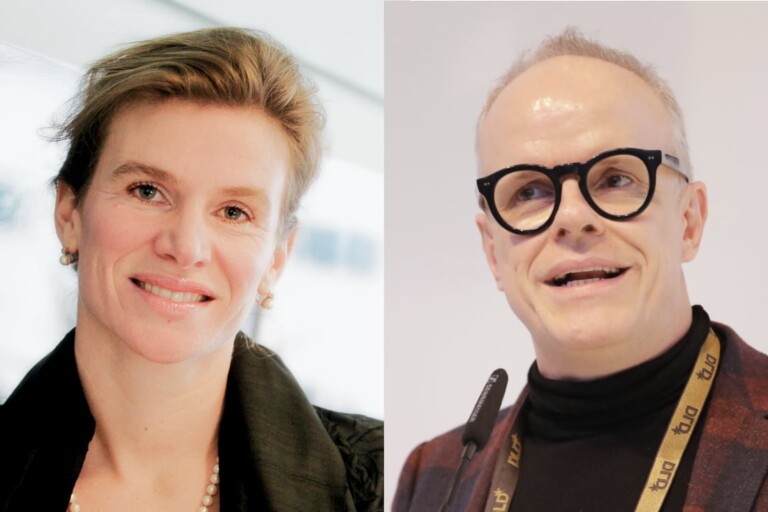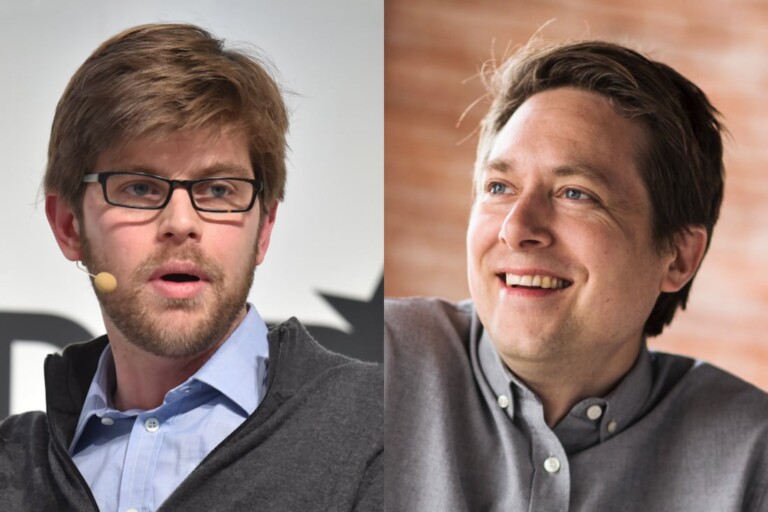
Digital Europe After Covid-19
DLD Sync: Watch investor Klaus Hommels and Merck CEO Stefan Oschmann discuss the continent’s economic future in a post-pandemic world.
How can European startups master the coronavirus crisis? Is the innovation ecosystem on the Old Continent healthy enough to weather the pandemic and, perhaps, emerge from the lockdown stronger than before? Are investors adventurous enough to finance groundbreaking ideas? What role do the EU and local governments play in speeding up digital transformation?
In a DLD Sync session moderated by Handelsblatt Deputy Editor Sebastian Matthes, Lakestar founder Klaus Hommels and Merck Group CEO Stefan Oschmann took a close look at Europe’s competitive advantages – and shortcomings – in a fast-changing global economy. Key insights follow below, along with a video recording of this wide-ranging, thought-provoking conversation about a business landscape that may forever be changed by the Covid-19 pandemic.
Sebastian Matthes is editor-in-chief of Handelsblatt. Previously he was editor in chief of HuffPost Germany and he worked for publications like the business magazine WirtschaftsWoche, Financial Times Germany and Neue Zürcher Zeitung.
Klaus Hommels is the Founder of Lakestar, one of Europe’s leading technology investors and Chairman of the NATO Innovation Fund. A prominent voice for the European tech ecosystem, his aim is to strengthen Europe’s sovereignty in times of digital transformation. Hommels was an early investor in many successful companies, including Skype, Spotify, Airbnb, Klarna, Zoom, Coinbase, and Isar Aerospace.
Stefan Oschmann was Chairman of the Executive Board and CEO of Merck until 2021. He drove the transformation of the Biopharma business by optimizing its cost structures and improving the efficiency of its research & development model. Before joining Merck, Stefan Oschmann worked for the U.S. pharma company MSD, where he served in a range of senior executive positions.
Biotech: Europe’s Best Shot?
In the hunt for a vaccine protecting us from the novel coronavirus, two companies from Germany have drawn worldwide attention, Stefan Oschmann noted: Both CureVac and BioNTech are leaders in a field of research named mRNA therapeutics. The technology in essence uses molecules synthetically designed to prompt the body to heal itself.
A medical trial by U.S. biotech startup Moderna seemed to show the potential of this approach to quickly develop a Covid-19 vaccine. While some experts cautioned that the trial had severe limitations, Oschmann was confident that this field of research holds great promise.
“In biotech, I believe, Europe will be a hotspot”, the Merck CEO said, calling mRNA therapeutics “a revolutionary technology” that could be used to fight cancer as well as epidemics. “If we’re super lucky we may have a vaccine later this year”, Oschmann said. “If we’re just lucky we may have a vaccine around this time next year.”
He also warned, however, that a vaccine “will not be used in mass administration early on”. Instead it would likely be restricted to high-risk groups of the population while manufacturers ramp up production.
Preparing For A Comeback
The pandemic may have badly affected many companies large and small, Klaus Hommels observed; but when it comes to recovering from the crisis, technology-driven firms have a clear advantage. “Digital infrastructures allow these companies to react very quickly to changes”, the Lakestar founder said.
A company like travel startup GetYourGuide – part of Lakestar’s investment portfolio – could, for example, easily shift spending from marketing to product development, Hommels suggested, only to emerge stronger from the crisis. “When everything opens up again these companies will win”, Hommels predicted. “And they will win at the cost of incumbent players.”
In addition, Hommels sees the pandemic serving as a catalyst for digital transformation. “There are a lot people who were reluctant to get into this digital business and are now forced to go into this digital business”, Hommels said. (A sentiment also expressed by Sir Martin Sorrell in a recent DLD Sync session.) The winners of this trend, digital service providers of all sorts, benefit from having “no customer acquisition cost” and “loyal, long-lasting customers coming onboard”, Hommels observed.
Nurturing Innovation
Much of Europe’s economic success currently rests on the shoulders of industrial giants – from car and train manufacturers to producers of chemicals, pharmaceuticals and consumer goods. But what about digital services, artificial intelligence and other future-forward technologies?
“We do have 1,500 world market leaders in [the small and medium business sector] and we’re very strong in academia”, Klaus Hommels said. “But we haven’t had a decent funding environment.” Success stories like Spotify and Zalando were largely due to special circumstances, he pointed out, advocating a more deliberate push in European venture investment – particularly to grow future digital champions.
Stefan Oschmann agreed, calling for a change in regulation to make it easier for institutional investors to participate in venture capital funding. Investing in startups was naturally risky, he admitted, “but it’s not more risky than other investments if you take a basket approach to it”.
More money, however, was not enough, Oschmann said. Europe also needed to provide better support to entrepreneurs and corporations. “There are plenty of good ideas in Europe”, Oschmann said. “What is lacking is a dedicated government policy and a coherent innovation ecosystem in which people cooperate without borders.”
On the upside, he added, the pandemic was clearly having a positive effect in this regard, driving the idea home that science and business need to interact more closely in Europe. “My impression is that this crisis was a major wake-up call for our politicians in that respect”, Oschmann said.
Future Opportunities
Besides biotech, quantum computing could turn out to be a driver of growth for the European economy, Stefan Oschmann suggested. “I think Europe has a chance to become a major player in this area”, he said, adding that Merck had invested in a number of startups in this field through its own venture fund.
The search for meat alternatives was another field of opportunity that both speakers singled out. “I think there’s a lot of future in food technology because if we want to make a [positive] impact on the environment we really need to think differently”, Oschmann said. Lakestar, which recently raised some 700 million euros for future investments, was also looking at this field, Klaus Hommels added.
Asked how the coronavirus crisis had changed their lives on a personal level, both executives agreed that video conferencing had positively surprised them. “We made investments where we didn’t meet the founders in real life”, Klaus Hommels said – something he had never considered possible before the pandemic-induced lockdown. “I do believe this is here to stay, rather than being an exception.”
Similarly, Stefan Oschmann explained how he had successfully switched from flying around the world to mastering various video-conferencing tools, keeping in touch with colleagues and business partners in different time zones on a daily basis. “I don’t think it’s completely sustainable”, he said, “but I was absolutely surprised how well that works.”


